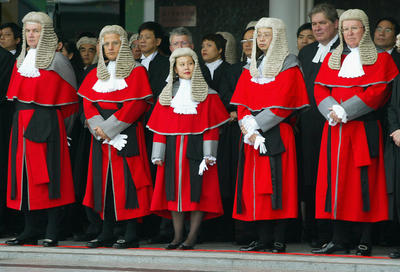Authoritarian regimes turn to the courts for many reasons: to facilitate economic growth, to maintain social order, and to supervise and discipline local officials. Or they may use courts to define the relationships between central and local governments, monitor the boundaries between competing state organs, distance the ruling regime from unpopular decisions, and enhance regime legitimacy at home and abroad.
Conversely, it is assumed that democratic regimes favour judicial independence. Yet, many legal systems in developing democracies are plagued by judicial corruption, incompetence and inefficiency. The judiciary is often controlled by the executive, beholden to the political and economic elite, threatened by organised crime, and subject to social pressure from the general public and media. Clearly much depends on the particular regime, whether authoritarian or democratic.
In China, blanket denunciations of the lack of meaningful judicial independence fail to capture a much more complex reality. The courts handle over 8 million cases a year. Judicial independence is not an issue in many cases, nor is the source, likelihood or impact of interference the same across cases.
There is a need to examine a wider range of cases than just the high profile conflicts involving political dissidents so prominently featured in the reports of human rights groups and the Western media.
Following the historical development of legal systems in Europe, America, Asia and some countries in Eastern Europe, Latin America and the Middle East it is now clear that there is no single path toward the rule of law. The role and influence of foreign actors and the mimicking or transplanting of Euro-American institutions, values and practices into developing nations are now being called into question.
There is a danger of description passing as prescription, or of condemning deviations from a ‘standard’ model for promoting judicial independence. Thus, China’s regulatory innovations — including individual case supervision, adjudicative committees, an extensive incentive structure for judges, and, most of all, the role of Party organs in the court system — have all been widely criticised. Yet the wide variation in legal systems calls into question what is needed, as do the poor results when developing countries imitate practices that have evolved over centuries in developed countries
The lacklustre results from rule of law reform efforts strongly suggest there is a need for a more empirical, less ideological approach to assessing legal reforms in general and issues such as judicial independence or the role of the Party in the judiciary in particular. Judicial independence in China is far more complicated than is often recognised. Judicial behaviour cannot be explained without thick descriptions of the legal arguments, resource constraints and strategic interpretations open to the courts in a particular context. China’s innovations or current practices may be problematic, but we lack the empirical foundation to make a judgment one way or the other.
Attempts to create independent judiciaries around the globe have demonstrated that the process is holistic. Reforms affect not just the judiciary as an institution but substantive and procedural law, the balance of power among state organs as well as social attitudes and practices. An approach focused primarily on the judiciary, or even on state institutions, is not sufficient.
Legal reforms must also be prioritised. Although judicial independence must be balanced with judicial accountability, the proper balance, and the methods, mechanisms and institutions to achieve it, vary depending on the context. Judicial independence is not an end in itself but a means to other goals — there is substantive disagreement in China about how independent the courts should be and whether the courts are the appropriate forum for resolving certain types of disputes.
While the most pressing issues in low-income countries are weak institutions and a lack of resources, political economy issues become more important as countries enter the middle-income stage. In China, the main emphasis has been on politically safer reforms aimed at promoting judicial efficiency, legal predictability and legal consistency in the economic sector.
Whether courts are the proper forum for resolving certain disputes will depend on the level of economic development, the status of the court, the relation of the judiciary to other political organs and the competence and integrity of judges. Forcing courts to hear socio-economic cases for which they are unable to provide an effective remedy undermines confidence in the judiciary. While the long-term solution is to outgrow such problems, in the meantime the courts will still play a role, enforcing minimal standards and reviewing decisions by administrative or government agencies after parties have exhausted their judicial remedies.
Given the diverse nature of the problems, there is no silver bullet that will ensure ‘meaningful’ judicial independence in China. Reforms must be tailored to the particular circumstances. In China there has been limited progress to create a more qualified and authoritative judiciary, able to handle an increasingly wide range of cases independently and competently. Nevertheless, as in other authoritarian regimes, there are likely to be limits on judicial independence in China, most notably in political cases that are perceived to challenge the ruling regime’s grip on power.
Randall Peerenboom is Professor of Law and Management at LaTrobe University.
This piece appeared in the most recent edition of the East Asia Forum Quarterly, ‘Regulatory Awakening‘.

